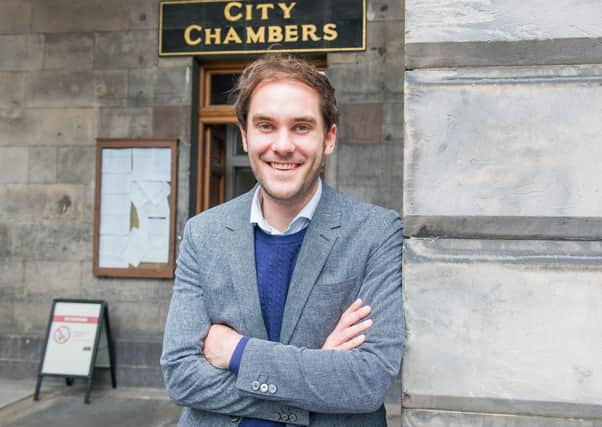What Edinburgh Council leader Adam McVey just said about business is astounding – John McLellan


As Edinburgh Council plans a revolution of transport and travel across the city and comes to terms with the looming financial collapse of Lothian Buses, it was a moment of startling clarity.
The man in charge, council leader Adam McVey, told last week’s policy and sustainability committee, the fortnightly video meeting which is now the focus of democratic accountability in Edinburgh, that he “wasn’t entirely sure where in the transport hierarchy of place design businesses fit”.
Advertisement
Hide AdAdvertisement
Hide AdThe uncertainty is at a time when the Scottish Retail Consortium is figuring out how their members will survive with a collapse of over 70 per cent in non-food business, and the Federation of Small Business wonder how shops in places like Victoria Street will cope if customers can’t reach them in any great number and access for their deliveries is hampered.
It is not, as the council leader acknowledged, about primacy of one part of the population over another, but to admit to a lack of understanding about where business fits was astounding when the transport network is about to be turned upside down both in the short and long terms.
The new UK labour market survey out this week was a stark illustration of the crisis, indicating the number of Scottish people claiming unemployment benefit had shot up by 75,000 to 188,000, a staggering 67 per cent. And this does not include the impact of furloughed workers, which will be about 700,000 in Scotland from a total of approximately 2.65m, or those self-employed people whose income has crashed.
The hardest hit sector will unquestionably be accommodation and hospitality, responsible for around 14 per cent of the Edinburgh economy and supporting over 30,000 jobs, the vast majority of which now look very unlikely to return until 2021 and even then it’s improbable they will be back in anything like the same number.
Advertisement
Hide AdAdvertisement
Hide AdVisitors spent about £1.7bn in Edinburgh in 2018, which looks very much like being £1.7bn which will not be making its way into the accounts of Edinburgh businesses this year, with the knock-on impact on retail, transport, information and business services.
Chancellor Rishi Sunak’s extension of the furlough scheme to October was the right thing to do to give staff breathing space while the employment market tries to regroup, especially in a place like Edinburgh with so much hanging on a sector which has been flattened. But with fears of a second wave to infections limiting the chances of a full release of lockdown, rather than a gradual easing, he was wise to warn there is little hope of an immediate economic bounce-back.
The Economist magazine reported this week a forecast from three American academics that 42 per cent of pandemic job losses are likely to become permanent, and while this isn’t the USA even if it’s pessimistic by, for argument’s sake, ten points, it would still represent a third of all jobs currently suspended not coming back.
That could mean the Scottish claimant count soaring to nearly 400,000. It makes this week’s estimate by the Edinburgh Poverty Commission of an additional 13,000 unemployed in the Capital seem positively upbeat.
Advertisement
Hide AdAdvertisement
Hide AdIt also represents a huge demand on public spending which is only just beginning, and even if Mr Sunak is successful in persuading companies to wean themselves off the furlough scheme it will be replaced by demand on the social security system and intensify the pressure on taxation.
The Poverty Commission was constituted at a time when Edinburgh’s prosperity was taken for granted, driven by a basic belief that in a wealthy place a lot more needed to be done to spread the benefits and while that core purpose remains the assumptions which underpinned it have been smashed.
However incomplete and hampered by practical restrictions its new interim report may be, it provides a sharp reminder that economic well-being has as much impact on the most vulnerable as their physical health.
It’s unclear if Cllr McVey’s administration understands... or wants to understand... where business fits into any hierarchy, but there is one inescapable fact; none of what he or anyone else wants to achieve is possible without thriving businesses to generate the taxes which pay for it all.
A message from the Editor
Advertisement
Hide AdAdvertisement
Hide AdThank you for reading this story on our website. While I have your attention, I also have an important request to make of you.
In order for us to continue to provide high quality and trusted local news on this free-to-read site, I am asking you to also please purchase a copy of our newspaper.
Our journalists are highly trained and our content is independently regulated by IPSO to some of the most rigorous standards in the world. But being your eyes and ears comes at a price. So we need your support more than ever to buy our newspapers during this crisis.
With the coronavirus lockdown having a major impact on many of our local valued advertisers - and consequently the advertising that we receive - we are more reliant than ever on you helping us to provide you with news and information by buying a copy of our newspaper.
Thank you
Joy Yates
Editorial Director
Comment Guidelines
National World encourages reader discussion on our stories. User feedback, insights and back-and-forth exchanges add a rich layer of context to reporting. Please review our Community Guidelines before commenting.